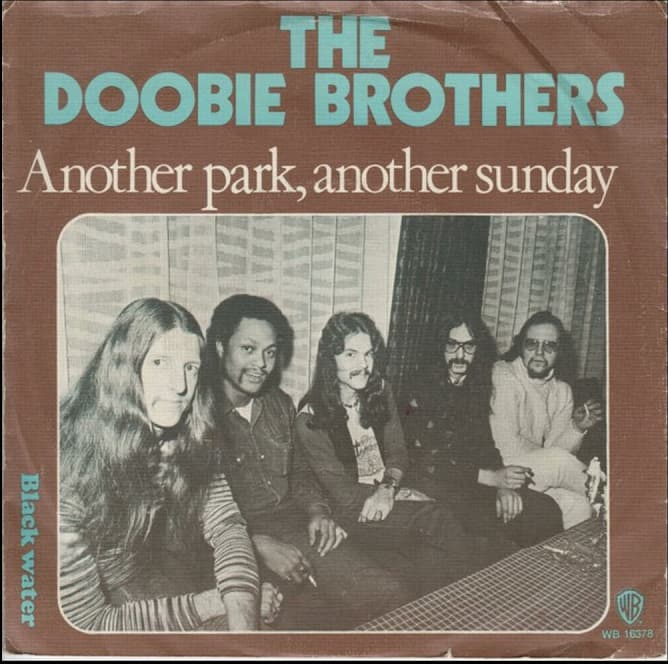
The Doobie Brothers – “Another Park, Another Sunday”: A Melancholy Reflection on Lost Love and the Pain of Moving On
The Doobie Brothers’ “Another Park, Another Sunday” is a soulful, introspective track that explores the heartache of a broken relationship and the difficulty of moving forward. Released in 1974 on their album What Were Once Vices Are Now Habits, the song stands out as one of the band’s more tender and reflective pieces. Written by Tom Johnston, “Another Park, Another Sunday” captures the loneliness, nostalgia, and bittersweet memories that follow a breakup, blending the Doobies’ signature mix of rock, soul, and country elements with lyrics that resonate deeply with anyone who has loved and lost.
The song opens with a gentle, melancholy guitar riff that immediately sets a contemplative mood. The melody is soft and subdued, as though echoing the quiet sadness of the lyrics. This relaxed, introspective arrangement allows the listener to connect with the emotions at the core of the song. The use of acoustic guitar, complemented by subtle percussion and bass, gives the song a feeling of simplicity and sincerity, drawing listeners in with a sound that feels both warm and wistful.
Lyrically, “Another Park, Another Sunday” tells the story of someone grappling with the end of a relationship and the memories that linger long after. Lines like “I’m sittin’ in a park in the Sunday sunshine, where we used to go” reflect the narrator’s attempt to hold onto places and moments that once felt special. These familiar scenes, now tinged with sadness, serve as reminders of what’s been lost, underscoring the theme of trying to move on while feeling anchored to the past. The phrase “another park, another Sunday” becomes symbolic of the endless cycle of trying to let go while being haunted by memories.
The chorus, “And it’s gone, gone, gone, and I can’t do a thing to make it come back,” captures the narrator’s sense of helplessness and sorrow. This repeated refrain emphasizes the finality of the relationship’s end and the painful realization that some things simply cannot be undone. Johnston’s vocal delivery here is tender and vulnerable, allowing listeners to feel the weight of his regret and resignation. His voice is filled with a sense of melancholy, as though he’s reflecting on memories that still hurt but are too precious to let go.
Johnston’s vocals are central to the song’s emotional impact, as he sings each line with a mixture of sorrow and acceptance. His voice is both soothing and expressive, capturing the quiet sadness of the song’s lyrics. He doesn’t exaggerate the emotion, allowing the natural feeling in his voice to carry the message. This understated delivery makes the song feel intimate and personal, as though Johnston is sharing a story from his own life.
Musically, “Another Park, Another Sunday” blends elements of rock, folk, and soul, creating a sound that is both familiar and comforting. The instrumentation is thoughtful and restrained, allowing each instrument to support the vocals without overwhelming them. The gentle guitar work and steady rhythm create a peaceful, almost meditative atmosphere, reflecting the theme of reflection and acceptance. The song’s structure is simple, yet it builds subtly toward each chorus, mirroring the cycle of hope and regret that often accompanies heartbreak.
One of the song’s standout features is its bridge, where the tempo picks up slightly, and the guitars take on a more rhythmic, driving quality. This shift in tempo adds an extra layer of emotion to the song, as though the narrator is trying to shake off his sadness and move forward, only to find himself drawn back into his memories. The instrumental arrangement reflects this push-and-pull, capturing the tension between letting go and holding on.
“Another Park, Another Sunday” may not have reached the same commercial success as some of The Doobie Brothers’ other hits, but it has become a fan favorite and is celebrated for its raw honesty and emotional depth. The song’s themes of loss, memory, and the struggle to move on resonate universally, making it a track that listeners can turn to during their own moments of reflection. It’s a song that offers comfort through shared experience, as if to say, “You’re not alone in feeling this way.”
Over the years, “Another Park, Another Sunday” has continued to resonate with listeners, especially those who appreciate songs that explore the complexities of love and loss. Its timeless message, combined with The Doobie Brothers’ masterful musicianship, has helped it remain relevant and meaningful across generations. The song’s quiet wisdom and gentle sound make it a perfect companion for anyone facing the bittersweet task of moving on from a relationship.
In the end, “Another Park, Another Sunday” is a tender reflection on love, loss, and memory. The Doobie Brothers capture the quiet sadness and beauty of remembering what once was and the difficulty of finding peace in its absence. For fans of thoughtful, introspective rock music, “Another Park, Another Sunday” remains a timeless piece that speaks to the heart, reminding listeners of the healing power of music and the comfort of shared emotions.